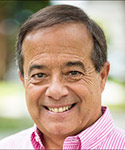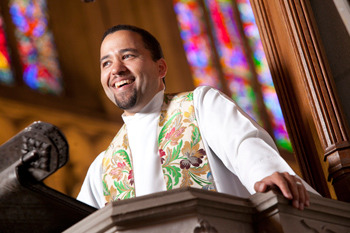Editor’s note: The following is adapted from a sermon delivered at Fairfax Presbyterian Church in Fairfax, Virginia, March 2, 2025, when the pastor returned from a two-month break supported by Leadership Education at Duke Divinity’s Reflective Leadership Grant.
Last fall, I climbed the tower of Duke Chapel along with a group of clergy colleagues. It was quite a climb: 239 steps, up a staircase that was narrow, steep and circular. At the top, we got a view of Duke University and the city of Durham that gave us a whole new perspective on the area. We could see how things fit together in a way we never could from the ground.
My colleagues and I had all received grants for a time of reflection on leadership, and we were given a fascinating challenge. We were told, “Get off the dance floor of your church, and go up to the balcony for a while.” There are things you can see from the balcony that you cannot see from the floor. I’ve been up on the balcony, but now I’m back. And I’m happy to start dancing with you all again.
Jesus knew the importance of balcony time. That’s why he “took with him Peter and John and James and went up on the mountain to pray.” Luke tells us that while Jesus “was praying, the appearance of his face changed, and his clothes became as bright as a flash of lightning.” Suddenly, the disciples “saw two men, Moses and Elijah, talking to him. They appeared in glory and were speaking about his exodus, which he was about to fulfill in Jerusalem” (Luke 9:28-31).
At the end of this mountaintop experience, God spoke from a cloud and said, “This is my Son, my Chosen; listen to him!” (Luke 9:35). In this event, called the transfiguration, the disciples were given a whole new perspective on Jesus, the Son of God. They saw how he fit together with Moses, the great law-giver, and Elijah, the greatest of the prophets. It is something they would not have seen from the dance floor.
So, what have I learned during my balcony time over the past two months? There are two things I want to share, as we move into the next year together. They are the importance of engagement and evaluation. These will be focal points for me, and I hope they will be for you as well. I think that both are essential for our financial well-being, and for our vitality as a congregation, as we move forward together. I am excited to be offering these reflections. I am not going to be like the disciples, who “kept silent and … told no one any of the things they had seen” (Luke 9:36).
First, engagement. In his first letter to Timothy, the apostle Paul tells his younger colleague that the aim of Christian instruction is “love that comes from a pure heart, a good conscience, and sincere faith.” Love is the aim of such instruction and the reason that it is offered. Anything else, he says, is “meaningless talk” (1 Timothy 1:5-6).
Over the next year, I want us to be engaged with one another in ways that are loving and faithful. I am glad that the small groups are resuming this month, and I am looking forward to being part of the hiking group. I would encourage each of you to join a small group, as we continue to rebuild our community. I also want to reengage with the affordable housing project, so that we can begin construction of these much-needed homes.
While on the balcony, I had lunch with Roy Howard, a retired Presbyterian minister. He told me that most American congregations lost 30 percent of their members during the pandemic. Most suffered financial impacts as well. We are not alone in the challenges we are facing. But we are moving in the right direction, with our unified service of worship, our Christian formation hour, our small groups, and other opportunities for engagement.
One commitment I am making for the next year is to have more personal contacts with you, the members of the church. In one of the books I read on the balcony, “Saying Goodbye,” Episcopal priest Warner White says that pastors should give extra time and attention to “the heart of the congregation,” the people who make up the church’s faithful leadership core. White describes them as “that group of parishioners who center in Christ by faithful worship, faithful giving, and faithful support and nurture of one another. They are the heart of the local body of Christ and he is at their center.” White’s advice to pastors like me is good advice. He says: “Listen to the heart.”
This is not to say that I should ignore other members of the church. But “the heart of the congregation” deserves extra time and attention because that is the group that will maintain the mission and ministry of the church for years to come.
Another book I read was “Necessary Endings” by Henry Cloud, a business coach and clinical psychologist. When a wealthy friend was telling Cloud about his history of investments, the friend said that he never invested in businesses: “‘What I invested in was what I always invest in: the person,’ he said. … ‘Surely I looked at [the business] and tried to understand as best I could, but the real investment was in the people.’” The future of a congregation is found not in its building or its budget, but in its people. That is certainly true here.
People are important to me whether they support me or not. Another teacher during my balcony time was Rabbi Edwin Friedman, an expert in congregational life. In his synagogue, he discovered that the most intensely negative members of the congregation were as invested in him as those who were the most positive. That’s surprising, isn’t it?
He realized that “criticism is a form of pursuit,” as he writes in his book “Generation to Generation.” Yes, criticism is a form of engagement. People who criticize are actually more invested than those who don’t care. So, I want this next year to be a time of engagement — with people who agree with me, and with people who do not. All I ask is that we show each other “love that comes from a pure heart, a good conscience, and sincere faith.”
After engagement comes evaluation. While at the London School of Theology in January, I had coffee with Alistair McKitterick, a lecturer in practical theology. He said that pastors and congregations should ask and answer the questions “What are we aiming at?” and “What is God aiming at?” The challenge for us, as a congregation, is to orient ourselves to God’s goals.
McKitterick reminds us that we are part of a story bigger than ourselves — the story that God is telling. In an essay on the role of teleology in practical theology, he challenges us to “to interpret the Word of God appropriately for a sense of direction” as part of “seeking the mind of Christ.” As we evaluate what we are doing here at Fairfax Presbyterian Church, we should identify what Christ has in mind for our community, and what role we are playing in God’s story.
So, how do we do this? In “Necessary Endings,” Cloud writes: “Whether we like it or not, endings are a part of life. They are woven into the fabric of life itself, both when it goes well, and also when it doesn’t. … For us to ever get to a new level, a new tomorrow, or the next step, something has to end.” One season has to end before a new one can begin.
Cloud believes in life cycles and seasons, and he encourages us to see that endings are healthy and normal. As organizations evaluate themselves, he recommends pruning. Just as a rosebush cannot reach its full potential without pruning, an organization cannot thrive without pruning. Cloud says that step one “is naming the ‘rose’ — in other words, defining the standard or goal you’re pruning toward. There is no one right answer, but without some clarity on what you are trying to achieve, you won’t know where to begin to bring about the necessary endings.”
I want to do the work of evaluation with you in the year to come, along with our elders, deacons and trustees. We need to “name the rose” by asking ourselves three questions: Who are we? Who are our neighbors? and Where is God leading us next?
Based on this assessment, we can begin the process of pruning. Such work is especially needed in this post-pandemic season, in which contributions to the church are still below their pre-pandemic levels. I am very hopeful about the results of this year’s Generosity Journey [giving campaign], but pruning is good regardless of our budget. It keeps us focused on what God desires for us. One goal for this year might be to prepare a three-year budget, so that we can be more strategic about our missions, our ministries and our staffing. The goal, says Cloud, is “defining what the bush is going to look like and pruning everything that is keeping it from realizing that vision.”
My time on the balcony taught me that I need to work with you on engagement and evaluation. Now that I am back on the dance floor, I am excited to get started. But, as I conclude this sermon, let me share a personal note.
As some of you know, I turned 65 in February. I have signed up for Medicare. What fun! I am trying to beef up my retirement savings. I am moving toward 40 years of ordained ministry and a quarter century as pastor here at FPC. Like all of us, I am not getting any younger.
I also want you to know that I am now receiving treatment for a recurrence of prostate cancer. I am undergoing hormone therapy and will soon get radiation. This illness does not have to be fatal, but it is always a disease of aging. One thing I know about myself is that I have been slow to accept my aging. When I was in my fifties, a colleague asked me how I felt about being a mentor to younger pastors. I was shocked, since I still thought of myself as a young pastor!
I am much closer to the end of my ministry than to the beginning. But that is OK. The Bible gives me comfort. The original Greek of the New Testament has the word telos, which means “end.” It can refer to the end of life or the end of the world. But it has other meanings as well, which I really love: It can also mean “purpose, aim, goal, culmination, completion, fulfillment.” These are really positive meanings that we can all apply to the various endings of our lives.
We will have the sacrament of the Lord’s Supper in just a few minutes. At the Last Supper that Jesus had with his disciples, Jesus loved them “to the end” — in Greek, telos (John 13:1). After washing their feet, he gave them a new commandment, saying, “love one another. Just as I have loved you, you also should love one another” (John 13:34). With this new commandment, he brought his ministry to a satisfying conclusion. Notice that Jesus achieved fulfillment with both his actions and his words — he washed their feet and told them to “love one another.”
If we focus on God’s endings, we can enjoy a very fruitful time together. We can love one another in words and actions, in a way that will have lasting impact on this church and this community. Amen.





















